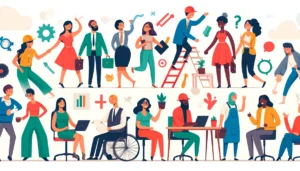Beyond generational frictions: The growing business case for intergenerational inclusion
- 4 Min Read
Employees with managers more than 12 years their senior are nearly 1.5 times as likely to report low productivity, and nearly three times as likely to report being extremely dissatisfied with their job.
- Author: Dr Daniel Jolles
- Date published: Feb 15, 2024
- Categories

Harnessing the ideas, experiences, and networks of talented employees from all generations has the potential to deliver significant productivity gains.
Yet generational diversity has received relatively little strategic attention from leaders to date. With birth rates largely declining and careers getting longer, leaders can expect their teams to span multiple generations. This increasing generational diversity should be good for business.
Like other forms of diversity, different generations can contribute to team knowledge, skills, and networks in complementary ways. But the productivity potential of this diversity can also be lost to divides and conflicts between different generations.
In our latest recent research report, we sought to understand how the different generations are working together currently, to identify any frictions, and to uncover the actions that leaders can take to get their multigenerational teams working better together.
Frictions between generations are deeply embedded in our history. As George Orwell wrote nearly 80 years ago, “Every generation imagines itself to be more intelligent than the one that went before it, and wiser than the one that comes after it.”
At work, we often hear clichés about ‘sensitive, demanding or lazy’ younger generations or ‘out of touch, change resistant’ older generations. There are multiple barriers to getting past these stereotypes and getting the best out of multigenerational teams.
These include; lack of quality data about generations at work, fear that prioritising generational diversity might distract from the much-needed efforts in traditionally underrepresented areas (gender and race / ethnicity, disability, sexuality, and neurodiversity), and the frequent use of generational labels such as ‘Generation Z’, ‘Millennials’ and ‘Baby Boomers’ to reinforce negative stereotypes rather than praise the positive, unique attitudes and experiences each generation brings to the workforce.
Despite an ageing workforce with less young talent in the pipeline, too few firms are taking action to ensure the inclusion of employees across generations.
The barriers and challenges confronting many older workers are well known, from recruitment discrimination, lack of training and development opportunities, and the early push towards dismissal or retirement. And although many recruitment initiatives are disproportionally aimed at attracting ‘younger talent’, our research suggests that this younger talent is not being nurtured or given the opportunity to thrive.
We find 25% of employees experience low productivity in their role. This is especially the case for younger generations, with 37% of Gen Z and 30% of Millennial employees reporting that they are experiencing low productivity. This appears to be fuelled by frictions with older managers.
Employees with managers more than 12 years their senior are nearly 1.5 times as likely to report low productivity, and nearly three times as likely to report being extremely dissatisfied with their job.
How can firms prevent generational frictions undermining productivity?
Our research identified specific intergenerationally inclusive work practices that bridge employee-manager age gaps and create better productivity for all generations. These include, creating an organisational culture that makes it easy for employees of all generations to ‘fit in’, ensuring managers are skilled at leading generationally diverse teams, and having a firm-wide commitment to hire, develop, and retain employees regardless of age.
These practices are good for everyone, but they appear especially important to younger workers. Intergenerationally inclusive work practices reduce the proportion of Gen Z employees reporting low productivity from 37% to 18%. As well as better productivity, employees at firms with intergenerationally-inclusive work practices are more satisfied with their job and are less likely to look for a new role outside the firm.
Over the past 12 years, Protiviti has conducted a global survey of C-level executives and directors to understand the top risks facing their businesses. Attracting, developing and retaining top talent, and addressing succession challenges is consistently viewed as one of the top risks faced by senior leaders.
Given this risk, in the race for talent and productivity firms cannot afford to overlook the potential business gains that come from intergenerational inclusion.
Dr Daniel Jolles is a Researcher in Behavioural Science at The Inclusion Initiative (TII) at the London School of Economics and Political Science. At TII, Daniel leads the GENERATIONS Research Hub in collaboration with global business consulting firm Protiviti.
GENERATIONS delivers data-driven insights to increase productivity across generations. Daniel holds a PhD in Psychology, and his research focuses on applying behavioural science to questions of generations, age-diversity, and the ageing workforce. This research is aimed at helping organisations create productive and inclusive multigenerational workforces.
He is a regular speaker and panellist on topics of career longevity and increasing the participation, wellbeing, and productivity of workers of all ages.







